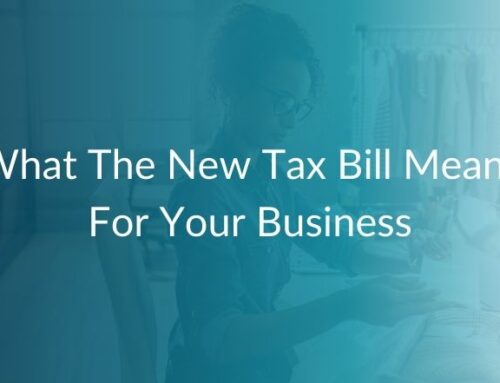A ND 5 TAX PLANNING MISTAKES TO AVOID…
What tax planning strategies are you using for your agency?
If the answer is “none”, you may be in trouble…
With tax season coming to an end, it’s more important than ever for agencies to start planning for next year.
-
What is your cash management strategy?
-
How are you scheduling your tax payments?
-
How are you utilizing your business structure for tax credits?
These are just a few of the questions that you may not know the answer to, but you should be thinking about as tax day grows closer and closer…
But, before you get too overwhelmed, there is a light at the end of the tunnel.
Tax planning doesn’t have to be an afterthought, and there is help available.
I’m going to show you some of the main tax planning strategies for agencies we use here at Richtr for our clients and also explain some of the biggest mistakes I see agencies making when it comes to planning for taxes.
But first, what is tax planning anyway?
WHAT IS TAX PLANNING?
In essence, tax planning is the analysis of a financial plan from a tax perspective.
This process of deconstructing how specific tax items relates to your company throughout the year helps you determine how to act on those items in the most tax efficient manner before the year ends.
If this sounds confusing, you’re not alone.
In fact, the entire tax process is so confusing that 67% of Americans believe it is unnecessarily complicated according to Time.com.
However, it is actually a fairly simple concept when broken down and digested piece by piece.
Once you understand the goal and process, you can understand the benefits.
What is the Goal of Tax Planning?
The goal of tax planning is to analyze your income and make plans for the best ways to file taxes and decrease the overall amount of money you pay in taxes, for your business.
This should be done year round and is made possible through collaboration with your business advisor and tax advisor.
What Are the Benefits of Tax Planning?
The two core benefits of proper tax planning are:
-
Savings
-
Improved cash flow
Engaging in tax planning can focus your attention on areas you need to think about when looking to pay the least amount possible in taxes.
If you’re an agency owner who wants to minimize your tax payments and the amount you owe in taxes each year (and who wouldn’t), then tax planning is for you.
TAX PLANNING PROCESS FOR AGENCIES
At this point, you may be wondering how the tax planning process works, and in what ways it calls for you to evaluate your business.
How we work with our clients to ensure that they have a solid tax plan on the books can be broken down into three categories:
-
Business Structuring
-
Tax Payment Planning
-
Cash Management
Business Structuring
When we first onboard a new agency client, one of the first things we need to uncover is their business structure.
This is because there are many different strategies an agency can utilize, but which one we recommend will depend on how the business has been structured.
Business structuring should ideally be evaluated before and during the growth stage of your business rather than after.
And I’ll talk more about that in a bit, but the idea is that if you choose the wrong structure, it’s harder to change once the business is up and running.
Conversely, if you wait too long to decide on a set structure, you will likely lose out on tax savings you would have otherwise garnered.
Tax Payments
Another step in the process is planning for regular tax payments.
It can be easy for an agency to forget to make their tax payments, simply because they were unaware that the payments were even due.
Another issue might be that a business owner didn’t set aside enough money to cover the tax payments.
Pre-planning for these payments helps agency owners think about how their income levels affect their obligation to make payments, as well as how to structure the timing of those payments.
So, one of the steps we go through is to map out upcoming payments and keep our clients in the loop about when taxes need to be paid and how long they can wait to pay before incurring any penalties.
Falling behind on tax payments can be a daunting situation for any business owner, but in the agency space where cash flow is hard to predict, it can be a killer.
Cash Management
Learning how to manage your agency’s cash income and structure how it fits into your tax payment plan is a necessary aspect of the planning process.
Coming up with a set strategy for handling your agency’s income can have a huge effect on your efforts to minimize tax payments.
Something worth noting is that a lot of our clients believe that they have to pay taxes right away, but in reality, you can prioritize where you put the money as long as all taxes are paid by the end of the year.
We work with our clients to come up with the best plan for cash management throughout the year in order to minimize the impact of paying taxes all at once.
TAX REDUCTION STRATEGIES FOR AGENCIES
Now that you know the main areas we evaluate during tax planning, here are some strategies you can use to reduce your taxes and maximize success.
Choose an Accounting Method and Stick With It
All agencies have the option to choose how they want to report expenses and income based on their business model.
As an agency owner, it’s imperative that you comprehend the difference between the two main accounting methods: cash and accrual.
Even if you have an in-house CFO or a partner like Richtr handling your financial reporting, it’s important to understand how each one works so we can all work together to make the best bookkeeping decisions for your agency.
You can decide to report income and expenses on an accrual basis, which involves waiting until you complete a project to report the funds, or on a cash basis, which involves reporting funds as soon as you receive them and paying taxes on them that same year.
The option you choose will make a difference in your company’s ability to schedule tax payments, which is why it is vital that you make an educated decision.
Also, it is important to note that the method of reporting your agency uses should not be changed from year to year.
Doing so has a high cost and requires owners to fill out a lot of forms each time they attempt to make a change.
Accelerate Expenses at the End of the Year
This strategy is for expenses you plan to benefit from toward the beginning of the year.
Rather than paying at the time you need the product or service (say in February), you can choose to pay for the expenses before or on December 31st.
Doing this will provide you with a tax credit for the expense, which means your liability for it is postponed by a year.
Find and Utilize Tax Credits
Tax credits are typically awarded as a way to promote positive behavior in employers; however, from a business standpoint, they are simply a means of receiving pure cash back from the government.
Examples range from tax credits for providing education to credits for making energy-saving improvements to your business.
R&D TAX CREDIT
You may have also heard of the R&D tax credit, which has been used in the past to incentivize employers to hire U.S. employees.
This particular credit is for companies that are researching and developing things that may not have technical feasibility—including software. The R&D tax credit is a great example of an angle for digital agencies, creative agencies, and development shops that is often overlooked.
In fact, we find that many of our clients produce eligible work for their clients when doing software development, however, not all research and development activities will qualify you for this credit. The type of work required for eligibility is often higher-end custom development (standalone applications, some complex comma platforms or other complexities vs. modification of a template website, etc).
WHICH TAX CREDITS DO YOU QUALIFY FOR?
If you’re hoping to learn what tax credits are available to your business, we’d recommend tax planning services in addition to hiring a CPA, rather than simply relying on tax preparers during tax season.
This is because it is hard, if not impossible, for a CPA to deduce the information needed to determine what tax credits your business qualifies for.
They are only involved in your business’ financials for a short period of time, once a year – and usually they are looking at them from a historical perspective. Conversely, Richtr Financial Studio works with you to look into the future to help map what is to come.
However, the regular meetings associated with tax planning provide more business context and thus increase our ability to identify possible tax credits.
One way we might discover which credits are available is to regularly audit your business operations and transactions.
This can help us determine which credits are available to your business under current operations and which may be available if you were to do the operations/transactions in a different way, thus allowing us to make the best recommendations for the future.
Increase Your Withholding
This is another strategy that can be used in certain financial situations.
Although it’s typically a faux pas for someone to increase their withholding, there is one instance in which you would want to do so.
If you made more money than usual last year, and you anticipate making the same amount this year, increasing your personal withholding would likely be the best decision.
Increasing your withholding means that the IRS will take more money throughout the year (ouch), but you won’t have a giant sum to pay at the end of the year. The worst thing you can do is realize you owe the government a bunch of money, and you have nothing in your account to pay them!
But, in all other instances, you wouldn’t want to increase it at all. If you increase your withholding without making more money, you are basically giving the IRS an interest free loan.
Sure, you’ll get a nice refund at the end of the year, but for most agencies, that money would have been more useful supporting the business throughout the year rather than in the government’s pocket.
Lowering Your Tax Rate
One of the biggest goals when filing your taxes as a business is to lower your tax rate.
Sounds simple, right?
But, what if I told you it involves timing?
The best time to lower your tax rate is when you’re making more than normal but knowing when that will be involves a lot of planning and analysis of your business projections.
It is also important to plan for what deductions you’ll utilize when the time comes to lower your tax rate.
Remember: maximizing deductions lowers your net income. The lower your net income, the lower your tax rate.
Controlling the Time When the Tax is Paid
Some things are better discussed in private.
Fill out our contact form with a note if you want to know more about this strategy that can be used for tax reduction.
5 COMMON TAX PLANNING MISTAKES THAT AGENCIES MAKE
Now that you know the basics to tax planning, let’s talk about some of the most common mistakes we see agencies make when it comes to their taxes.
1. Not Choosing The Right Accounting Method
This is the whole “accrual vs. cash” debate we discussed earlier.
If you don’t decide on a set way to report income and expenditures, you’ll lose out on a lot of tax deductions.
As a best practice, project-based agencies should use the accrual method and agencies that primarily do monthly retainers should choose cash basis reporting.
If your agency does both types of operations, you can even structure the reporting to be a hybrid of the two methods – accrual for projects and cash for your monthly clients.
2. Choosing the Wrong Business Structure
A lot of agencies don’t think about business structuring until it’s too late to structure in a way that saves on taxes.
Each of the four business structures have their pros and cons, and doing your research before starting your business is the best way to avoid making a mistake. However, there are ways to remedy a misstep, which is one of the main reasons why tax planning services are so helpful.
Learn more about the benefits of each business structure and entity type to see if you may benefit from changing course.
3. Improper Amount of Cash in the Bank
The third item worth noting is that agencies must be aware of their cash flow, in order to best pay their taxes and maintain their company bank account and finances.
You should always know just how much you can take out for investments while still being able to handle expenses like payroll.
If you take out too much, your business can suffer.
On the flip side, not taking enough out of the bank frequently causes businesses to miss out on investment opportunities that could have had a positive impact on their profit margins, which brings me to the next big mistake about cash flow planning.
A rapid increase in company profitability can catch many agency owners off guard. Navigating cash flow and cash requirements throughout the year is critical when you’re in a rapid growth phase.
4. Lack of Cash Flow Planning
A lot of agencies have trouble with cash flow planning due to the nature of the agency business.
Project-based agencies never know when the next big deal will come in, and monthly retainer-based agencies can have clients whose contracts dictate that they pay on some ungodly pay schedule (net 90? Come on).
Or sometimes they pay late, or don’t pay at all (ouch).
It is important to think about your obligations and decide how cash will be distributed after it’s deposited into your account. Even with proper cash flow planning, it can be tough to anticipate when cash will be needed or where it needs to go.
But, without cash flow planning, an agency can find themselves dead in the water if a client pays late or breaks their contract.
How can you pay your office rent? Your employees? …Your taxes?
Being able to predict cash flow and plan how it should be utilized in advance is better than having no insight and spending on a whim. Having a concrete plan is the only way to safeguard against unforeseen issues that could crush your business.
5. No Cash Projections
Not only do agencies need to have a plan for their cash, they need to have solid data backing up their plan. It is a mistake when agencies don’t create cash projections for their business.
Having a cash flow projection is the best way to begin creating a cash flow plan.
Understanding cash flow from projection to plan can help you make educated decisions for tax and business planning, which means you can be bolder in your business decisions and will be better able to determine when taxes need to go out, as well as how much each payment should be.
WHY YOUR AGENCY SHOULD INVEST IN TAX PLANNING
The fact is, a lot of agency owners do not possess the knowledge of the tax system required to stay out of trouble with the IRS, but they don’t want to invest in the planning side of things.
It can be tempting to buy a program like TurboTax instead of paying for outside help, but the truth is, having a professional by your side is safer and will save you more money in the long-run.
Bottom line?
Now that you understand the goals, benefits, and common mistakes of tax planning, you can see why moving towards organizing your agency to be more tax efficient is a win-win. And whether you decide to outsource the process of tax planning or take on the project in-house, your agency will reap the rewards of this investment if done right.
Have more questions about tax planning that I didn’t cover here?
We are always happy to talk shop with you.







